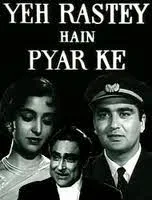Ethiroli (Echo, Tamil, 1970)
Story, Screenplay, Direction: P. Balachander
The opening scene of the movie says it all...
Sankaran (Sivaji) is a defence lawyer who stands flabbergasted as the prosecuting officer (VS Ragavan) crumbles his case where a defenceless women stands accused of murder.
Sankaran's turn to cross examine the main witness, pin drop silence, only the echo of the sound of the rotating fan. Camera moves on Sankaran's face. He walks towards the witness, staring. He does not say anything, just twirling a pair of reading glasses. He does not ask any question any question, just stares. Beads of perspiration are seen on the forehead of witness. Witness shivers. Prosecution cries foul, accusing of intimidation. Judge presses for Sankaran to proceed with questioning. Sankaran stays mum, still staring at the witness with fury. All of a sudden, the witness breaks down. He admitted that he never saw the accused actually run from the site of crime as he was bad sighted and was not donning his spectacles at the time of incident! Accused is free to go.

The opening scene itself showed that it was going to be one heck of a movie. Sivaji with expressive (sometimes over melodramatic) acting with KR Vijaya as his equally emotional consort gave justice to the role of display of various human emotions and human conundrum in this highly expressive noir-like not your usual run-of-the-mill Kollywood offering.
Sankaran is hot-shot lawyer who has set his future set in from him. Rumours are that he would be promoted to the the judge's bench pretty soon. As per formula of a good movie at the box office, comedy is compulsory. This is provided by Nagesh who actually is actually Sankaran's college mate together with the Prosecuting Officer. Nagesh failed his examinations and became a police constable. The constant nag by his wife about his lowly paid job provides comic relief through his antics of masquerading as a Police Inspector and a marriage broker.
Sankaran is trusted by one of his clients to pay a princely sum of cash to courts. The money is somehow stolen en route to the courts. All his efforts at recovering the monies or a loan proved futile. Upon returning from Tenkasi after a failed loan effort, his luggage gets mixed up with a fellow traveller (TS Balaya, who later becomes his in law) and he returns home with a suitcase of money and jewellery, way above the amount he needed.
 |
| 7 Commandments |
The real climax of the movie is now. Sankaran is a desperate situation. He stands to lose his reputation and promotion. On the other hand, he is in the profession on upholding justice. After much haggling and debating with himself and his wife, through a draw of lots he decided to keep the money. Even the hammer that he used to crack the lock open reminded him of the gravel that he is going hold to uphold justice.
One by one, all the principles that he held to his life is seen crumble one by one. Coincidently, on his daughter's birthday, Sankaran had presented a board with his 7 principles of life - Do not lie; Do not mix with bad people; Do not get angry; Do not forget your duties; Do not steal; Do not show fury to God; Do not murder!
As the news of the missing money hits the papers, the taxi driver (Major Sunderajan) who transported Sankaran's luggage reads about it. He starts blackmailing Sankaran to keep mum. Here we can see the respect between a lawyer and a working class man slowly dwindling. Coincidentally, taxi driver's girlfriend is the woman in the beginning accused of murder.

The story progresses with Sankaran digging himself deeper and deeper into self destruction. Taxi driver uses Sankaran as a free pass every time he is low on cash.
To cut the long story short, taxi driver is shot dead. Sankaran is accused of murder (the last of the commandment). Another interesting court case ensues, this time Sankaran at the dock. His brother, SS Rajendran is prosecuting. Of course, all turns out well. Sankaran gets his promotion too. He resigns after the first day as the gravel reminded him of the hammer that he used to break the lock! The doubt that he fail in upholding justice just as he had made a wrong call when he was in dire straits. He thought that he might waver from the side of justice.
An excellent movie could not have been as good if any other actor had done the role. Sivaji and KR Vijaya showed their star presence. The other actors, excluding Nagesh, Sunderajan and Ballaya, were simply overshadowed - Sivakumar, SS Rajendran, Lakshmi, Vijayalalitha, OAK Devar.

Sometimes you wonder if all those who commit crime do indeed have an internal turmoil before doing an act which they are well aware that it is wrong in the first place or is it like an after thought when they find themselves in trouble deep!
A person's upbringing, backgrounds and believes make one feel guilty of his actions. Even if the man-made court of justice escapes him, the guilt may indeed increase his stress hormones making him in continual risk of flight which make in turn push into him a state of hyper metabolism, stress related ailments, premature ageing and maybe even death. Unless of course, if you of the personality disorder or psychopath type where you experience no guilt and no remorse!
 First they gave the physical appearance of man to Him. They gave Him our hue and variations. To give Him power and awe us, they increased certain capabilities, appendages, arsenal, power over beasts...
First they gave the physical appearance of man to Him. They gave Him our hue and variations. To give Him power and awe us, they increased certain capabilities, appendages, arsenal, power over beasts...


















